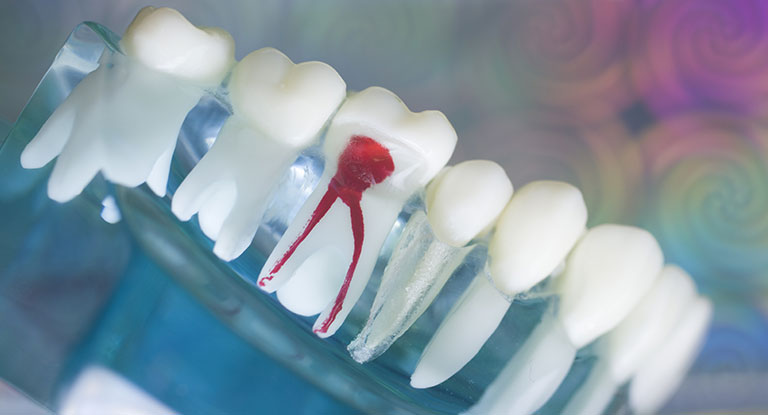

Dental decay affects the enamel, which is the protective part of the tooth, and it is mostly caused by sugary foods and drinks.
Dental decay occurs when the protective covering over the teeth (the enamel) and the dentine of the tooth become soft due to acid attack caused by eating sugary foods and drinking sugary liquids.
When this happens over time, the acid leaves holes (cavities) in your tooth. Dental decay is also known as tooth decay and dental caries.
Plaque acids are responsible for causing dental decay; it dissolves the enamel and the dentine of your tooth gradually. This decay damages your tooth to the extent that it might need filling or be taken out.
This is the hard protective coat covering the tooth — it is the hardest part of the body, and it does not contain blood vessels or nerves, and it is also not sensitive to pain.

Dentine lies just under the enamel — it forms most of the tooth, and it is very sensitive to pain. The central pulp of the tooth is covered with dentine.
This is the soft tissue in the middle of the tooth. It contains the blood vessels and nerves.
This is a sticky and thin film that forms on the teeth, it contains many types of bacteria, and it can make the mouth to smell.
Tooth decay happens when the sugar in the food and drinks you consume react with the bacteria in the plaque, thereby leading to the formation of acids.
Whenever you take any sugary thing, these acids attack your teeth. This dissolves the enamel and makes your teeth soft. This attack can last for an hour after eating or drinking before the natural salts in your saliva can make your enamel remineralise and harden again.
Sugars are not the only foods harmful to your teeth; others are carbohydrate-rich foods and drinks. They react with these plaques and form acids. Fermentable carbohydrates can cause this and examples are hidden sugars in processed foods, and also natural sugars found in cooked starches and fruits.
Always check food labels and ingredients before buying. Names of sugars you can find on processed foods are maltose, sucrose, and anything that ends with “ose”. You are increasing your risks of tooth decay when you take sugary or acidic snacks and drinks in between meals — you are putting your teeth under constant attack, and you are also not giving them enough time to recover.
Avoid having sugary drinks or snacks throughout the day.

There are no symptoms in the early signs of dental decay, but we can spot cavities in their early stages when we X-ray or examine your teeth.
This is why you should have regular dental check-up because it is easier to treat small cavities than when they have advanced into tooth decay.
Your tooth may become sensitive when the cavity has reached the dentine. This sensitivity is increased when you have sweet foods and drinks, and hot or acidic foods. You may suffer from toothache when the decay gets close to the dental pulp. The toothache may last for only a few seconds if it is caused by hot foods or sweet foods.
The pain may last longer, and you might have to take painkillers if the decay gets closer to the dental pulp; these drugs such as ibuprofen or paracetamol will help to control the pain.
If you are experiencing any of these, visit us immediately, because the tooth is dying and if it is not treated immediately, a dental abscess can develop.
Toothache is a sign that you should see a dentist immediately; it is a warning sign that something is wrong. And if you don’t take immediate action concerning this, it will get worse, and you may lose your tooth.
All these can be avoided if the treatment is done early.
The surfaces between the teeth and the biting surfaces of the teeth are more prone to decay because food particles and plaque can get stuck in these areas.
However, any part of the teeth can be at risk.
If the decay is not too severe, our dental team will remove the decay, and repair the tooth using a filling. In some cases, the nerves in the middle of the teeth can be damaged. If this is the case, we will have to carry out root canal treatment.
In this treatment, the nerve is removed, and the tooth is repaired by filling or with a crown. If the tooth is so bad that it can’t be repaired, we will have to take it out.
No, you will only need filling in the very early stages of decay. In this process, our dental team will apply a fluoride varnish on the area. This will help stop the decay from progressing, and it will also remineralise your tooth.
Make sure you follow the cleaning routine of your dentist, and you can use a fluoride toothpaste to prevent the decay from reoccurring.

A pit and fissure sealant can be used to protect the teeth when the molars appear, and the tooth is free of decay. This sealant is a plastic coating that fills all the little crevices on the surface of your teeth.
This creates a flat surface that is easier to clean. Adults can also have this treatment if they don’t have tooth decay. Our dental team will discuss if this treatment is right for you.
Fluoride varnishes can also be painted on the teeth of little children twice yearly; this will help reduce the risk of decay.
One of the most effective ways to prevent tooth decay is to brush your teeth thoroughly in the morning and night before going to bed using fluoride toothpaste.
When brushing your teeth, make sure you brush the inner surfaces, the outer surfaces, and the biting surfaces of your teeth. Make use of interdental brushes or dental tape or floss.
These help to remove food particles and plaque from in between your teeth which toothbrush can’t reach.
Yes, visit your dentist regularly. Visit as often as the dentist recommends, reduce your intake of sugary foods and drinks and avoid taking snack in between meals.
This will reduce the exposure of your teeth to acids, thereby reducing the attack on your teeth.
You can also chew sugar-free gum for 20 minutes after a meal to help boost the production of saliva and to dilute acids that have been formed.
We will show you how best to take care of your teeth and the areas you need to take care of the most when brushing your teeth. We will show you how to brush your teeth correctly and how to use floss or interdental brush to clean your teeth.
If you are suffering from dental decay, contact us today. We offer treatment and also give free and impartial advice concerning your oral health.